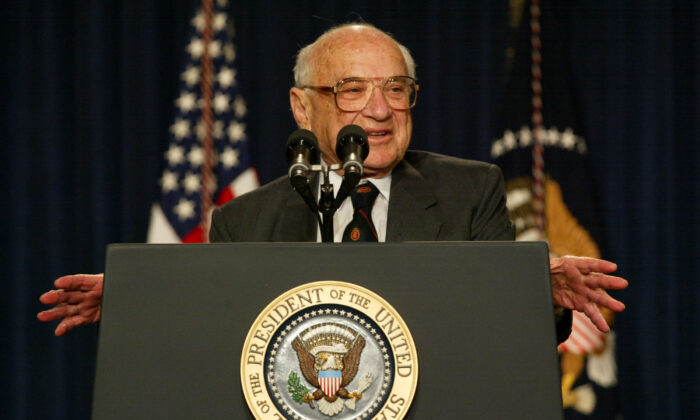Commentary
Elon Musk recently reposted a FEE social media clip of Milton Friedman discussing inflation.
The post has nearly 44 million views and hundreds of thousands of likes. What caused this clip to resonate with people such that it caught Musk’s attention and went so viral (garnering much more attention than the average post from Musk’s account)?
Let’s break down the clip into pieces to see why Friedman’s wisdom resonates with us today.
‘Inflation Is the Most Destructive Disease Known to Modern Societies’
The clip begins with a strong claim—inflation is unparalleled in its ability to destroy a society. Why would that be? Rising prices are bad, but can they really destroy a society?
Economists generally have a few different concerns with inflation’s deleterious effects on society. First, high rates of inflation cause people to engage in costly activities to avoid losing purchasing power. For example, people will run to the bank as soon as they get their paychecks and start spending money on consumer goods or other assets which aren’t losing value.
The resources and energy people use to convert deteriorating currency into stable assets are costly. In particular, economists call these costs shoe leather costs, alluding to how people would destroy their shoes in the now-metaphorical run to the bank.
Shoe leather costs are just one reason inflation is deleterious. Another reason inflation is harmful is that it disrupts money’s function of keeping track of the value of things. When prices are stable, we generally comprehend the relative value of different goods.
For example, we know that going out to eat at a restaurant is about five times more expensive than eating at home. However, in a world where prices are increasing at a fast rate, it may be difficult to keep track of the relative cost of things, leading to wasteful decisions. Inflation makes accounting (formal and informal) difficult.
Finally, and most importantly, inflation destroys societies because it destroys the ability to save. When you keep money in a savings account, rising prices mean that the money will be able to buy relatively fewer things. For example, if you have $12,000 in your savings account, and you spend $1,000 on rent per month, you have a year’s worth of rent in your savings account.
However, if inflation drives your rent up to $1,500 per month, your bank account now affords you four fewer months of rent.
This is damaging to society for two reasons. First of all, this frustration of people’s ability to plan causes chaos. A person who planned on having a year of savings must suddenly scramble in response to inflation.
Second, savings is the foundation of modern society. In order to increase our future wealth, we save our funds and resources or borrow from the savings of another. For example, there are two ways to afford a house. You could have spent years putting aside money so that you could make the purchase outright, or you could borrow from people (either directly or through an intermediary) who themselves have saved money.
All large-scale, long-term projects require savings. When savings are disincentivized, wealth creation stops (or is even reversed as people begin to consume their savings). This means that people will be more short-sighted in practice, and long-term economic growth will cease. This is why Friedman is so concerned about inflation.
The Cause of Inflation
Friedman then spends time in the video discussing the cause of inflation. He is clear at the start about what isn’t causing inflation. Friedman says, “[Inflation] doesn’t rise because you’ve got businessmen who are greedy; they’ve always been greedy.”
Many on the political left blame corporations for “price gouging” in order to fatten their profits. But blaming rising prices on profit-seeking is like blaming a plane crash on gravity.
Gravity is always pulling down on planes. To explain a plane crash, you have to explain what happened to the factors that had previously counteracted that downward pull. Why did gravity yank the plane down to earth when it did and not before?
Similarly, businesses are always seeking profit and are always ready to raise prices if that is what will maximize profits. To explain precipitous price hikes, you have to explain what happened to the factors that had previously put a lid on that upward price pressure.
So what is the source of inflation? Friedman argues that it’s policy. He points out that citizens have given politicians a difficult task. We ask politicians to spend other people’s money on us, but we don’t want them to spend our money on other people.
This framing is too generous to politicians because it implies that the fault rests on voters alone, but the point is simple. The political system incentivizes people to vote for policies which support their own interests today at the expense of voters down the road. But that means we’re holding the bag today from prior generations. But how does this spending turn into inflation? To get there, we need to look at one more quote from the video.
‘The Real Tax on the American People Is [Total Spending]’
Lastly, Friedman highlights that the official tax rate is not what matters. Instead, it’s total spending. Why?
Taxation is the most straightforward source of government funds. The government levies taxes on various aspects such as incomes, spending, property ownership, property sales, and inheritance. However, simply spending this money would not be the end of the story. For more than twenty years, the U.S. government has been experiencing a deficit where spending surpasses tax revenue. This deficit, represented as G-T=D+M, indicates that the government must rely on debt financing and money printing to cover the shortfall.
When government spending exceeds tax revenue, the only ways to fund the excess spending are through debt or money printing. While debt can postpone the issue, persistent deficits require payment through money printing in the long run. This influx of new money can lead to increased demand for goods, ultimately causing inflation as prices rise.
Moreover, money printing redirects wealth from savers towards government-directed projects, essentially extracting money from the private sector. Inflation resulting from money printing can be seen as a tax on savings, emphasizing the significance of total government spending over formal tax rates. As Henry Hazlitt pointed out, every dollar of government spending must eventually be covered by taxation.
In essence, the key takeaway from the Friedman video is the importance of monitoring government spending to anticipate future tax implications. Unchecked government spending can lead to higher taxes and inflation. To combat inflation, it is crucial to significantly curb government spending.
Please note that the views expressed in this article are the author’s opinions and may not necessarily align with those of The Epoch Times.
Source link







